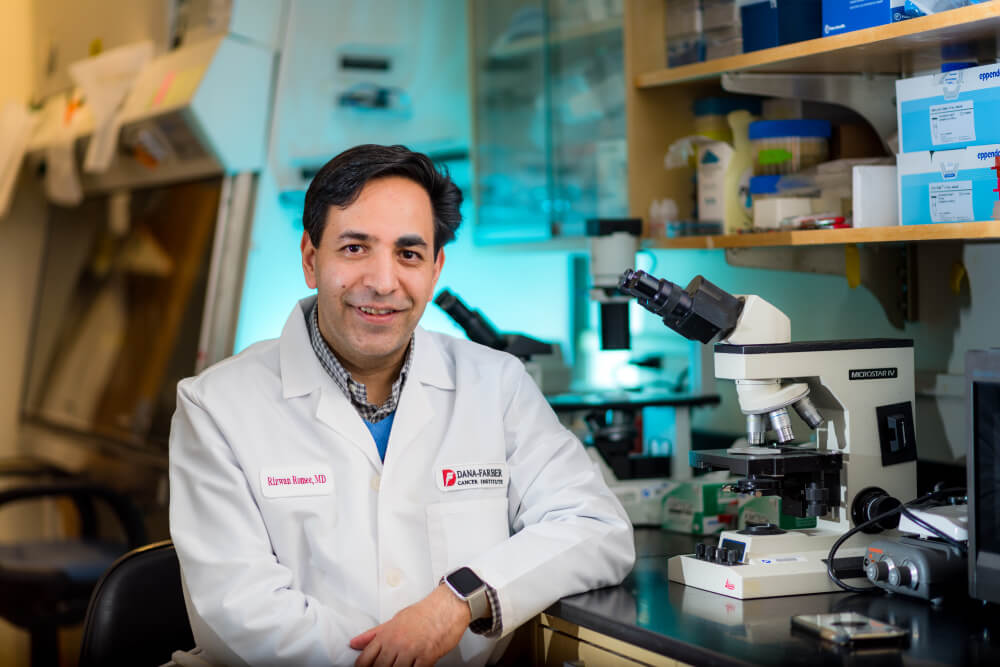Rizwan Romee, MD, is a medical oncologist at Dana-Farber and treats patients with advanced blood cancers such as leukemia and myelodysplastic syndrome. He is also the director of the Haploidentical Stem Cell Transplantation Program at Dana-Farber and principal investigator of the Romee Lab for NK Cell Gene Manipulation and Therapy.
Why did you decide to work in oncology?
Since very early childhood I was fascinated by biology, and when my cousin was diagnosed with acute leukemia, I became obsessed in learning more about cancer. When my cousin passed away, I felt sad and helpless and wanted to do something to help these patients. I went to medical school with the idea of one day being able to help patients in the clinic and work in the lab to help develop treatments for cancer patients with very limited treatment options.

What is your area of clinical specialty, and why? What conditions do you specialize in caring for?
Most of my patients have acute myeloid leukemia, myelodysplastic syndrome, acute lymphoblastic leukemia, and other hematologic malignancies.
My clinical areas are stem cell transplantation and cellular therapy. Transplants are typically used in patients with advanced blood cancers to eliminate malignant cells and restore the patient’s immune system. Cellular therapies are a new form of treatment that make use of immune cells bioengineered in the laboratory to target and attack cancer cells throughout the body when the disease has not been cured by standard treatments. This subspecialty allows me use cellular immunotherapy-based treatments to take care of patients.
What are the main challenges in this area? How do you address these challenges with patient and families?
While there have been significant advances in the field of stem cell transplants, a significant proportion of patients who receive them relapse. This is heartbreaking and represents a huge unmet need, as patients who relapse after transplant currently have very limited effective and safe treatment options. I try my best to get these patients on clinical trials early on, as I believe this is the only way to make progress in this area.
Overall, I bring as much compassion and honesty to my conversations with patients and families as possible.
Describe your particular research interests and why you chose to focus on them.
My research focus is on developing novel ways to harness immune cells — specifically natural killer (NK) cells — to treat patients with advanced cancer. At the Romee Lab, we are currently developing strategies to genetically modify memory-like NK cells in humans to enhance their ability to target and kill cancer cells. I became fascinated with immunology and immunotherapy during medical school after realizing we could potentially use our own immune system to target cancer, which I find very cool.
After coming to the United States for further training at the University of Minnesota with Jeffrey Miller, MD, I saw patients being treated on early phase clinical trials using NK cells from their family members. Some of these patients with very advanced leukemia had dramatic responses. That experience with Jeff Miller and then my second post-doc with Todd Fehniger, MD, PhD, at Washington University in Saint Louis led to my lifelong love with NK cells.
What are you most excited about in your area of expertise? What holds most promise for patients?
We have seen major advancements in the use of immunotherapy in cancer patients in last two decades or so. More recently, the development of CAR (chimeric antigen receptor) T cells has led to paradigm-changing approaches to treating cancer patients. NK cell-based approaches are relatively new, but in my opinion they hold great promise for developing novel immunotherapy approaches for both hematologic malignancies and solid tumors.
What do you like to do when you’re not doing clinical or research work?
I love to spend time with my family and travel (not much since the COVID-19 pandemic, though!). I also love bird photography. There is something unique about photographing birds which is quite relaxing to me — after all, birds are the direct descendants of dinosaurs!

Great to see my classmate.May you succeed and be a hope to mankind .